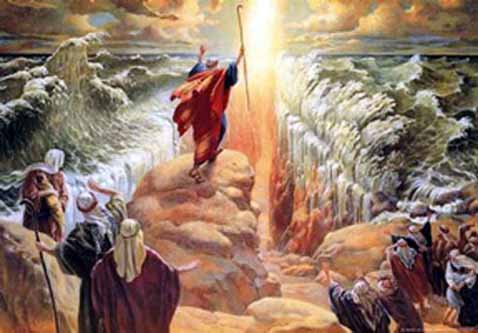A discussion of miracles is a discussion of sacred events of a divine nature that are not able to be reproduced by man. My goal in the first part of this discussion is to help us all gain a better appreciation for what miracles are, how they work, and how we benefit from them. We’ll look specifically, and very briefly, at the source of miracles, the history of miracles, modern miracles, and what makes a miracle possible.
Source of Miracles
Any discussion of miracles includes a discussion of the divine. This is difficult for anyone who is of the school of thought that there is no God or that even if there is a God, He does not have any dealings with man. Those of this way of thinking are confident that for each “miraculous” event some law of physics is at play that we just don’t understand. Either that or what happens is just a coincidence or freak accident, and that giving someone credit for making it happen is pure superstition.
The topic of miracles boils down to being a discussion of faith. Either you believe there is someone greater than us out there in the universe or you don’t. To those who have a belief in God, unexplainable events are a sign of God’s direct participation in our lives. The rules for this participation have been spelled out for us in scripture. I’ll talk more about the rules later.
Some things that appear to be unexplainable can, in fact, be explained. Think of magic tricks that appear to defy explanation. Obviously magicians are mere mortals, but they are so well practiced that they can trick the senses into witnessing things that appear to be miraculous in nature. To the uninitiated, even modern technology can appear to be miraculous. When I was in high school and I first heard that a computer company was working on creating a machine that could talk to other machines and transmit information through the air without any wires, I laughed at the sheer ridiculousness of the idea. Now I live by wireless, and I still don’t have any idea how it works. It’s a miracle to me, but not to those who know how it is done.
I guess it is important to know that to the Lord, what we consider miracles, is all very explainable and common. It is we who are uninitiated in the ways of God who are dumbfounded by His abilities. If we were able to understand all the laws by which He lives, miracles could be explained to us. But we don’t understand those laws, so we call these unexplainable events miracles. Fortunately, our lack of understanding does not diminish the good that miracles do for us.
Miracles in History
Occasionally the Lord has performed miracles to teach His people what He can do for them. Think of the children of Israel while they were in Egypt. They had no real clue as to who their God was after they had been in captivity for 400 years. He had to teach them about his own capabilities to save them.
Now fast forward to the New Testament and look at the comments Jesus made to those who sought “signs,” which are miracles demanded by unbelievers in order for Jesus to prove himself to them. He repeatedly told them that he would only perform miracles as a confirmation of faith shown on their part. He no longer needed to teach them about what he could do. They, as Jews, already had a long history of miracles behind them. Now His miracles would come at the price of faith on their part. In Matthew 12:39 Jesus said:
But he answered and said unto them, An evil and adulterous generation seeketh after a sign; and there shall no sign be given to it, but the sign of the prophet Jonas:
The sign of Jonas is the destruction of the people. Jonah had been sent to prophecy to Nineveh that if they did not repent they would be destroyed. So the Lord is saying that the only sign he gives to those who refuse to believe unless God first pays for their belief in miracles wrought, is the same destruction promised to the people of Nineveh for their wickedness.
Time and time again the unbelievers are condemned for their lack of faith. Only those who believed and demonstrated faith in the Lord’s ability to perform miracles were able to receive His miracles. That is a pretty standard pattern throughout the New Testament. There were miracles done out of compassion for people, but most were done because they had first demonstrated their faith in Christ.
Modern Miracles
As members of The Church of Jesus Christ of Latter-day Saints we sometimes feel like the early Saints had lots of miracles, and that miracles are hard to come by these days. Perhaps we hold ourselves to a different standard than the one we believe they lived up to. I don’t know for sure. What I do know is that in the early days of the Church everyone was a convert. Everyone had a simple faith, uncluttered by tradition or jaded by long exposure to the Lord’s ways.
Today, with many of us who are sixth or seventh generation members of the Church, we as a people have settled into a routine that didn’t exist 150+ years ago. The organization of the Church is well defined. Life has been pretty predictable for many decades, and we may have to work harder now to find ways to exercise our faith.
Do modern miracles still exist? You bet they do. Are they as wonderful and as spectacular as they were in the past? You bet they are. So why don’t we hear about them? Why don’t the Brethren talk about them over the pulpit? Primarily it is because they are considered to be sacred experiences, and we have learned that sacred things are not to be discussed casually. It falls under the category of not casting your pearls before swine.
So what are some of our modern-day miracles? Think of how many missionaries we have in the field. We have a few deaths of our missionaries each year, each of them tragic and sad. But if you look at the death rate for people their age who are not on missions, the death rate is a good eight times higher. This tells me that many of our missionaries are being protected by the Lord while they are in the mission field. And what about all the missionaries who are able to learn foreign languages and social protocols in just 18 months to two years? The ability of our missionaries to learn languages is unmatched and unrivaled by any other group or government in the world. The gift of tongues is alive and well in the Church.
My point here is that miracles in the modern Church are so common that we often don’t see them for what they are. We take these miracles for granted because they have become so common among us. The sick are healed, prayers are answered, and people are saved from harm on a regular basis. We have come to expect this level of performance in the Lord’s Church. No one else outside of the Church expects this level of blessings from the Lord. We have become a richly blessed people, and the number of miracles in our lives has become so numerous that we sometimes become color blind to them. Miracles have become woven into the very fabric of our religion so they no longer stand out like they did in the early days of the Church.
What Makes a Miracle Possible
To me, this is a difficult question. Yes, miracles take belief and faith, faith being action applied to our belief. But miracles require more than that. There seems to be an element of our personal agency involved in whether miracles can happen in our lives. For example, I may believe that God can perform a certain miracle in my life. I may apply my faith that He can do it by acting in appropriate ways to demonstrate my belief. But if I am still entertaining my own personal timetable and expect God to do His miracle in the way I want it done, I probably won’t see that miracle come to pass.
Next week we’ll talk about learning to let go of control over our miracles, the sacred nature of miracles, and the promise of miracles. There are also two great talks linked to the bottom of next week’s articles for further reading on the nature and power of miracles in our modern lives.
About Kelly P. Merrill
Kelly Merrill is semi retired and writes for https://gospelstudy.us. He lives with his wife in Idaho. His strength is being able to take difficult to understand subjects and break them down into understandable parts. He delights in writing about the gospel of Christ. Writing about the gospel is his personal missionary work to the members of the Church and to those of other faiths who are wanting to know more about Christ's gospel and His Church.







I am a convert to the Church of Jesus Christ of Latter-day Saints and joined after being a Catholic for the first 18 years of my life (10 of those years included attending parochial school). In the Catholic church, miracles are more the domain of the hierarchy of the church. For example, before a person is canonized a “saint”, the Catholic church (or Pope) must verify that a certain amount of miracles can be attributed to that person. Similar to personal revelation, real miracles are limited to a very few and then the miracle must be proclaimed as a “true miracle” by one who has that authority. How grateful I am to know that I live in a day of personal revelation and of miracles. I have witnessed many small and big miracles in the 40 years I have been a member of the Church. As a missionary, my mission president counseled us to look for the miracles in our lives and then to talk of them with our companions and to bear testimony of them to others when appropriate. I believe recognizing miracles is directly connected to our ability to receive personal revelation. There is no better feeling in the world than when the spirit whispers “you just witnessed a miracle.” I do not require someone else to verify my miracles for me.
Is there a Part 2?
Yes! https://ldsblogs.com/27987/miracles-part-2
I was once chastised by a students parents for teaching of the miracles that can happen with Christ. Two families said that I shouldn’t teach this power because not everyone can experience it. They even bore testimony to this from the pulpit. How far from the truth they were. We live in a time that miracles happen often and if it were expedient a mountain would move from its place that’s how powerful the Lord is and more. The fact that we have discovered the power of wireless communication is a miracle. The rapid advancement of technology after the Lord’s Church was brought back in fullness (The Church of Jesus Christ of Latter Day Saints) is miraculous. The power a young uneducated boy was given to create a society of education, culture, government that prospered so that the sight of it rising from the malaria infested swamp land struck fear in the heart’s of those without the truth. Yes, miracles, manifestations, revelation, gift’s of the spirit and everything else given to us by God illustrated in scripture is alive and well. Our youth? They will need a fervent knowledge of this truth if they are to survive the Latter Days. #ThesearetheLatterdays
Excellent article. I remember Bro Nibley said the secret of miracles was in the “timing”.